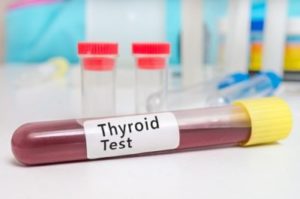6. Iodine deficiency and hypothyroidism
Iodine is needed to make thyroid hormone. Iodine is actually what determines the form of thyroid hormone. T4 is thyroid hormone with 4 iodine’s attached. T3 is thyroid hormone with only 3 iodine’s attached.
In the case of severe iodine deficiency the thyroid gland may swell up in an attempt to pull in as much iodine from the blood stream as possible. This is called a goiter. Decades ago goiters were very common in certain geographic areas with iodine poor soil. Fortifying salt with iodine has been credited with largely reducing this problem. Besides goiter iodine deficiency is associated with impaired mental function and hypothyroidism symptoms. [21][22]
Currently conventional medical dogma is that a typical diet gives people sufficient iodine for thyroid hormone production.
The iodine – thyroid controversy
Some holistic practitioners believe that iodine deficiency is rampart and a major cause for chronic illness. Others are as dismissive as medical doctors and warn that iodine supplementation is dangerous.
With such conflicting information it took me some time to form my current position on iodine. I also understand how this issue can be terribly confusing to lay people who are looking for answers on the Internet. Why do the “experts,” have such different opinions?
A few reasons why we may need more iodine than most people are getting
Current medical thinking on iodine, is based on a 1940’s model, of how much is needed to prevent goiters. However, just because someone does not develop a goiter, does that mean their thyroid really has enough iodine for optimal health? [23] [24]
Iodine may also be needed elsewhere, besides the thyroid. For example, research has shown improvement in fibrocystic breast disease when supplementing with at least 3.0 mg of iodine per day. [25] The current RDA for iodine is 150 mcg. 3 mg equals 3000 mcg. Therefore, research shows possible benefits to supplementing with iodine at doses far above the current RDA.
There is concern that other halogens we are exposed to, bromide (in bread products) and fluoride interfere with iodine function.
Tests for iodine deficiency
Iodine patch test
A two inch square section of skin is painted with liquid iodine solution (sold at any drug store as an antiseptic). In theory if you are iodine deficient, your body needs the iodine, will quickly soak up the iodine and the patch will disappear. On the other hand, if you are not iodine deficient the patch will remain for 24 hours until the iodine is slowly absorbed.
Therefore, the quicker the iodine is absorbed, the more deficient in iodine you are.
Problems with the iodine patch test:
No precise way to measure out how much iodine is applied to the skin.
I have seen this test explained many times. Each time I am told to apply a 2-inch square of iodine. Personal interpretation of how thick the coating to use, patient skin color, concentration of iodine solution, and even altitude (iodine will evaporate more quickly in Denver, then at sea level) may change results.
Everyone fails the iodine patch tests.
How is it possible that everyone is deficient in iodine?
At seminars I’ve basically been told: “Everyone fails the test because everyone is iodine deficient. Everyone is iodine deficient because everyone fails the test.” This is circular logic.
Iodine urine test
50 mg of iodine supplement is ingested followed by a 24 hour urine collection. The theory is that if the body needs the iodine, very little will be excreted in the urine.
This test is still controversial.
The test assumes that absorption of iodine from the digestive tract is always the same. The other assumption is that if the body is not excreting excess iodine in the urine then it must have a need for it. There are many substances that the body doesn’t need (ie. toxins such as lead, mercury, plastics), yet may not be efficient at excreting.
Interfering iodine status from thyroid lab tests
Measuring TSH and T4 (thyroxine) may be a useful marker for iodine status in “children and adolescents, adults, women, and those at moderate thyroxine (T4) status.” However this is not true for all people such as pregnant and lactating women, or those supplementing with “moderate daily supplementation.” [26]
Iodine side effects – why we don’t need more iodine
Many web sites that state iodine supplementation is not dangerous. This simply is not true.
Iodine excess can contribute to numerous health conditions including multi nodular goiter, Graves disease (hyperthyroidism) and Hashimoto’s thyroiditis. Myself and other practitioners in the natural health field see people coming in with such symptoms after taking iodine. [27]
Sometimes people overdose on iodine because a practitioner told them to. Other times they do so after reading up online on how everyone needs iodinet. Iodine itself is not bad, and some people are deficient. However, much of the information you’ll find online about iodine is one sided (all for against supplementation).
Side effects of overdosing on iodine include:
- Rashes, itching or lesions on the skin
- Heart palpitations
- Faster heart rate
- Gastrointestinal symptoms such as diarrhea
- Hyperthyroidism
- Hypothyroidism
Notice both hyperthyroidism and hypothyroidism are side effects of iodine. Not everyone will react the same to it.
How can iodine, which is needed to make thyroid hormone, cause hypothyroidism? This is due to something called the Wolff-Chaikoff Effect. In some people, a sudden increase in iodine will cause the thyroid gland to temporarily stop absorbing iodine. This can cause hypothyroidism.
Other Internet misinformation
It is often repeated that the average daily intake of iodine in Japan is 13.8 mg. Just search the keywords “Japan,” “iodine,” and “13.8.” Countless web sites will pop up parroting this information and convincing people they need to supplement with iodine.
In truth, this number of 13.8mg has been disproved. The average intake of iodine in Japan seems to be only 1 – 5 mg per day. [28] There is also evidence that the increased intake of iodine in Japan has actually led to thyroid dysfunction [29].
How to supplement with iodine?
As mentioned above iodine can cause temporary hypothyroidism due to the Wolf-Chaikoff Effect. This physiological effect is well established in the scientific literature. [30] [31].
Nonetheless, the Wolf-Chaikoff Effect is not very common, short term (only about 24 to 48 hours) and has not stopped researchers from supporting iodine supplementation when appropriate. [32]
Depending on dose, everything no matter how natural is dangerous. For example, when the titanic sunk, hundreds of people died from an overdose of water. In other words they drowned. Of course that doesn’t mean water is bad. It simply means that like everything else, water is dose dependant. Iodine and all other supplements are no exceptions. [33]
If labs and clinical history indicate possible need for iodine then dosing should start low, and gradually increased. Thyroid labs such as TSH and T4 can be used to help, in addition to the overall clinical picture. [34]







